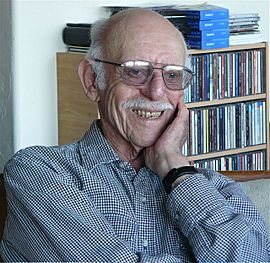Lester Rodney facts for kids
Quick facts for kids
Lester Rodney
|
|
|---|---|

Lester Rodney, September 2007, photograph by Byron LaGoy
|
|
| Born | April 17, 1911 |
| Died | December 20, 2009 (aged 98) |
| Occupation | Journalist |
Lester Rodney (born April 17, 1911 – died December 20, 2009) was an American journalist. He played a big part in ending the rule that kept Black players out of baseball. He did this as a sports writer for a newspaper called the Daily Worker.
Contents
Early Life and Challenges
Lester Rodney was born in Manhattan, New York City. He was the third of four children. When he was six, his family moved to Brooklyn. This is where he became a lifelong fan of the Dodgers baseball team.
In 1929, the Great Depression started. This was a time when many people lost their jobs and money. Lester's father lost his business and then their family home. Because of this, Lester could not finish college. He had a scholarship for track at Syracuse University, but his family could not pay the rest of the tuition. To help his family, he took many different jobs.
Fighting for Fairness in Sports
Lester loved sports. In 1936, he got a job writing for the Daily Worker newspaper. This paper was connected to the Communist Party USA. At the Daily Worker, Lester could combine his love for sports with his strong belief in social justice. He wanted to make things fair for everyone.
Breaking the Baseball Color Line
Lester's main goal was to end the rule that kept Black players out of Major League Baseball. This rule was called the color line. Many people, including Jewish Americans like Lester, felt they were treated unfairly. Lester saw that it was wrong to fight against unfair treatment in other countries while Black people in the United States faced discrimination.
Lester was allowed to write freely in his sports column. He criticized baseball, America, and even Adolf Hitler to show that some Black baseball players were just as good as white players. Before Lester, the Daily Worker's sports section was not very interesting. Lester wrote to the editor, Clarence Hathaway, and said that sports were important to workers. The editor was impressed and gave Lester the job.
Lester started writing about sports in a new way. He focused on how sports affected society. He did special reports on race and sports. He wrote about talented Black players from the Negro Leagues. He helped start the movement to integrate baseball in the 1930s.
In an interview, Lester said he realized that no one was talking about the unfairness in baseball. He wondered why people with "the wrong pigmentation of skin" could not play. He looked for proof that baseball should be integrated. He asked white players how they felt about it. They all said they would support integration, even though team owners disagreed. Lester often criticized Branch Rickey, who was the general manager of his favorite team, the Dodgers.
World War II and Jackie Robinson
Lester Rodney served in the military during World War II. While he was serving, Branch Rickey signed Jackie Robinson to a minor league contract. Robinson was a war veteran from Los Angeles. World War II helped change minds about baseball integration. Black men were fighting and dying for the U.S., but they still could not play in the Major Leagues.
Lester's newspaper had been writing about Jackie Robinson's skills for nine years before he was signed. The Daily Worker's editor, Mike Gold, praised Lester for his efforts in making desegregation happen. Lester was one of the few white sportswriters who wrote a lot about Black athletes.
One of Lester's close friends was Satchel Paige. Lester wrote many stories about Paige because he was one of the best pitchers ever. But Paige did not get the fame he deserved because he played in the Negro League. Lester's sports page often featured more stories about Joe Louis and Kenny Washington than about white athletes. Other sportswriters sometimes gave Lester information to publish, even if they could not use it themselves.
After the war, Lester met Clare, who became his second wife. She was a teacher. They got married on April 21, 1946. Lester stayed with the Daily Worker until the mid-1950s, continuing to focus on racial issues in sports.
New Beginnings in California
In 1956, a new leader in the Communist Party, Nikita Khrushchev, spoke about the bad things Joseph Stalin had done. After this, Lester Rodney and the Daily Worker's editor, John Gates, tried to open up the newspaper for more discussion. But the leaders of the Communist Party stopped this. They even stopped printing the paper every day.
After 22 years as a sports writer, Lester Rodney left the Communist Party and the Daily Worker in January 1958. He moved to Torrance, California, with his wife Clare. They lived there for 31 years. Lester kept working as a journalist. He was notably the Religion editor for the Long-Beach Press Telegram newspaper.
Lester and Clare had two children, Amy and Ray, and later a granddaughter named Jessie. Lester stayed active his whole life by playing sports. In his 60s, he became a very good senior amateur tennis player. He was ranked as the number one or two player in his age group in California until he stopped competing in 1998.
In 1990, the Rodneys moved to Walnut Creek, California. Clare passed away in May 2004.
Lester Rodney was honored in 2005. He was added to the Baseball Reliquary's Shrine of the Eternals.
Lester Rodney celebrated his 96th birthday on April 17, 2007, in Walnut Creek, California. He passed away on December 20, 2009, at the age of 98.
 | Shirley Ann Jackson |
 | Garett Morgan |
 | J. Ernest Wilkins Jr. |
 | Elijah McCoy |

